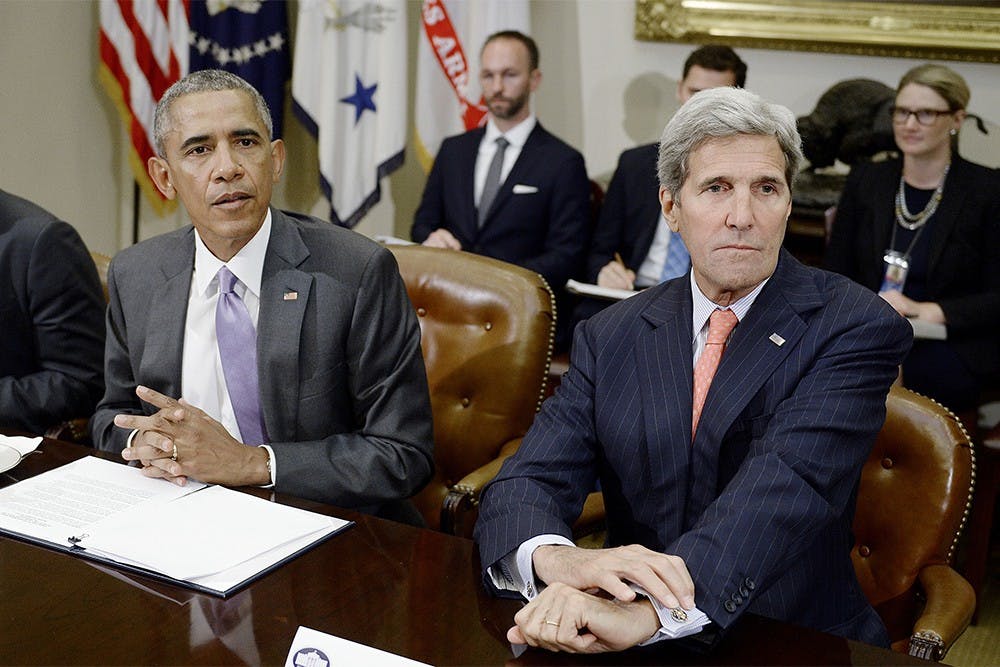President Obama, along with other supporters of the Iran nuclear deal, is placing unearned trust in Iran's government. Although supporters are celebrating the deal's passage right now, this agreement is only a temporary speed bump in Iran's plan to continue to aid anti-Israeli organizations and oppose Israel's quest to remain peaceful and prosperous.
The deal that has now passed includes a comprehensive outline chartering the disintegration of Iran's current nuclear program. As Iran continues to disassemble its centrifuges and reactors over the coming months, international economic sanctions currently in place will eventually be lifted.
Iran will gain access to its frozen overseas accounts gradually as they reduce its nuclear capabilities in accordance with the deal. The amount of money Iran will gain is the real danger.
Obama is unconcerned with Iran's funding of dangerous anti-Zionist movements. According to NPR, "the U.S. Treasury Department says Iran stands to recover $100 billion once sanctions are lifted under the new nuclear deal. The money comes from Iranian oil sales and has been piling up in some international banks over the past few years."
Congressional delegates and Israeli officials, primarily Benjamin Netanyahu, fear that this downpour of funds and assets will go to funding terrorist organizations such as Hezbollah.
The concern is that this gold rush will only serve to strengthen Iran and put the country in a position to overwhelmingly dominate the region once the deal has concluded in 25 years.
This nuclear deal is dangerous and will ultimately lead to Iran gaining vast superiority in the region as it will stand to gain billions of dollars from investments, oil sales, arm sales and many other manners of making money. Obama's administration has turned a blind eye to the needs and fears of Israel as Israelis worry over how much of this newly gained wealth will go to funding Hezbollah and other dangerous organizations.
Executive director of the Foundation for the Defense of Democracies Mark Dubowitz shares this fear. "We have no ability to constrain Iran if they want to spend all $100 billion on funding Hezbollah or other terrorist organizations," he warns. "But when you're getting a $100 billion-plus cash windfall, even if you're spending 5 to 10 percent of that only on the regional activities and your support for terrorism, that's an extra $5 to $10 billion dollars-plus."
Furthermore, this nuclear deal in no way shape or form protects against Iran's pursuit of nuclear weapons after its completion. In fact, the deal "preserves Iran’s ability to produce as much nuclear fuel as it wishes after year 15 of the agreement, and allows it to conduct research on advanced centrifuges after the eighth year," according to the New York TImes.
Even more disappointing, Iran will eventually be able to import and export conventional arms such as I.C.B.M.s (Intercontinental Ballistic Missiles) into and out of Iran.
Iran's ability to traffic ballistic missiles defeats the purpose of the nuclear deal by allowing Iran to attack Israel along with any of its supporters, including the U.S., hence the "intercontinental" in I.C.B.M.
The Obama administration lacks an understanding of Iran's ambitions in the Middle East, and Obama just wants to get the deal done no matter how poorly it is thought through.
Even if the Iranian government holds true to its end of the bargain over the next 25 years, which is highly unlikely, and the deal minimizes its nuclear capabilities, as soon as the deal expires, Iranians will begin working on Ayatollah Ali Khomeini's goal: to exert dominance in the region and eventually destroy Israel.
Related Links:
Letter: Nuclear Iran would trigger Middle East arms race
Letter: Further sanctions against Iran would close negotiations
Reach the columnist at gpaulsoccer@yahoo.com or follow @GrahamASUpress on Twitter.
Editor’s note: The opinions presented in this column are the author’s and do not imply any endorsement from The State Press or its editors.
Want to join the conversation? Send an email to opiniondesk.statepress@gmail.com. Keep letters under 300 words and be sure to include your university affiliation. Anonymity will not be granted.
Like The State Press on Facebook and follow @statepress on Twitter




